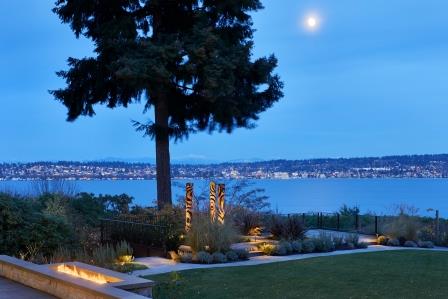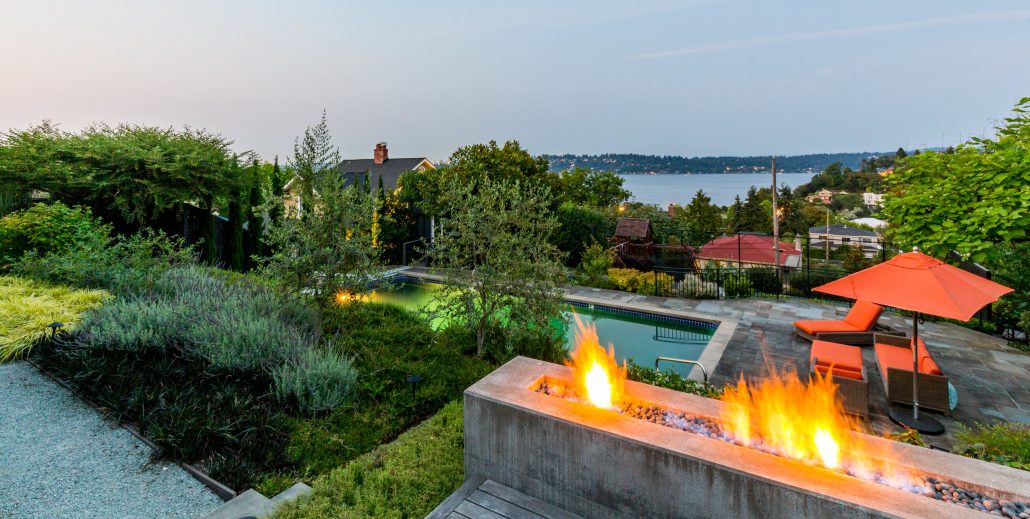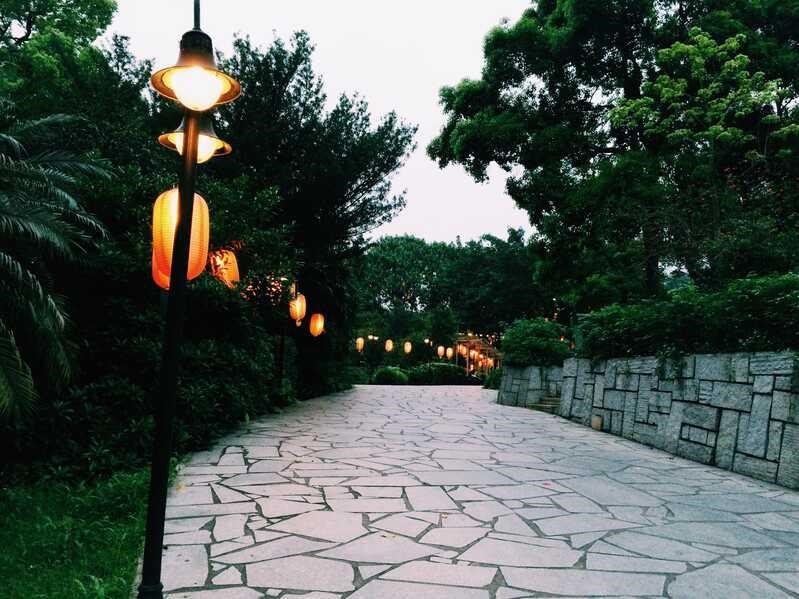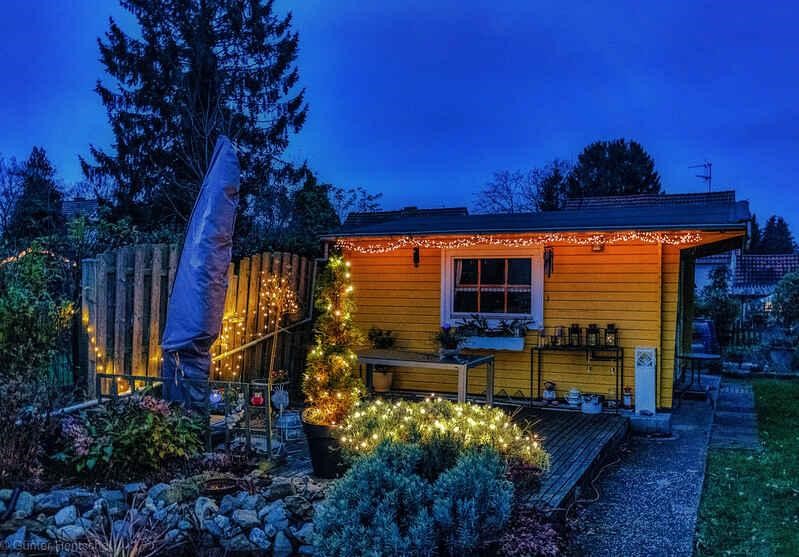The Art of Garden Lighting: Enhancing Your Landscape’s Beauty After Dark
By Teri Silver for Seattle Landscape Architect Brooks Kolb
Garden and landscape lighting gives your Seattle home a sensual after-dark glow, enhancing the overall beauty of the property. Lighting up the garden and landscaping is more than placing a fixture here and there. Before heading to the home improvement store, plan your project by first deciding on what your objectives are.
Do you want a tranquil setting for evening relaxation? How about ambient lighting near pathways and seating areas? Maybe a party atmosphere? Aesthetics aside, landscape lighting increases home security and pedestrian safety.
Low Voltage Lighting

Windermere Garden – Seattle Landscape Architect Brooks Kolb/photo by Ben Benschneider
Most landscape lighting installed today is low voltage. Unlike standard 120-volt systems that run inside the house, low voltage LED systems are safer to use outdoors and use considerably less power. Low voltage systems bring the ambience of lighting that mimics anything from soft moonlight to stronger glows for your garden and deck or patio space.
Landscape Lighting
In whatever ways you want to bring the landscape design to life, lighting is divided into three categories: uplighting, downlighting, and pathway lighting.
Uplighting comes from fixtures placed directly on the ground and pointing upward. Set ground lights next to trees, flagpoles, and statues to bring the object into view and create dramatic accents of light and shadow. Trees with umbrella canopies like Japanese Maples and multi-trunk trees like Crape Myrtle are particularly graceful to uplight.
Downlighting casts diffused light from atop a structure, like a pole, pergola, or building wall.
Pathway lighting brightens up steps and paths, providing safety for your walk to and from the house and around the garden.
Think of uplighting as being primarily about accenting and creating beauty, downlighting as providing light for outdoor dining or socializing, and pathway lighting as providing safety.
Here are some classic ways to enhance the outside of your Seattle home with perimeter and landscape lighting.

Mount Baker Garden – Seattle Landscape Architect Brooks Kolb/photo by Miranda Estes
Welcome Home!

The first thing people see when they look at your Seattle house is the front yard, garage, and front door.
At twilight or nighttime, the front garden benefits from a few bright spots, especially up pathways to the front door. Wall wash lighting brings an indirect, angled glow to the object of a flat surface.
Wall grazing — where the light shines upward — highlights rough textures like paving bricks and stucco. The accents made by double sconce lights — shining upwards and downwards at once—can be particularly beautiful.
Sconces and pathway lighting welcome visitors to the home. Motion sensors can help by momentarily illuminating a door knob or lighting the way to your garbage and recycle area, or by revealing the presence of a criminal prowler, but are annoying and obtrusive. In most cases, they should be avoided.
Solar Sunshine
Sunshine is light, and gardens need sunshine, so use that to your advantage. Outdoor solar lighting can substitute for low-voltage LED lighting, especially to illuminate areas in the garden where it’s cost-prohibitive to run low-voltage wiring, such as the opposite side of a driveway.
Solar lights must recharge in direct sunshine during the day — the sunnier the exposure, the more powerful and longer-lasting they’ll be at night. Solar lights have come far in the last few years and will continue to improve in the future.
Their major advantage is the same as their disadvantage: since they don’t need wiring, you can easily pluck them from the ground, which means they can be stolen. The other disadvantage is that they tend to burn out fairly quickly, but again, the solar lighting industry is constantly improving them.
Hints:
- Place a few solar sticks inside flower beds and along the driveway.
- Brighten up gardens with a little extra nighttime light — courtesy of the sun.
- Layer solar sticks around the deck or patio and near trees and shrubbery.
Enhancement Lighting

Christmas lights aren’t just for Christmas anymore! Color the backyard with strings of LED lights that sparkle throughout pergolas, tree canopies, gazebos, and patio umbrellas.
Choose from just about anything you can think of … be quirky and express your personality with festive holiday themes, hobbies, or even sports teams — we have plenty to choose from here with the Mariners, Seahawks, Sounders, Supersonics, and Kraken. Many of these LED string lights can change color with the click of a button on a remote or an app on your phone.
Festive lighting might include fairy lights in many colors, Japanese lanterns, globes, ornaments, fake candles, and light-infused decorations.
Smarten Up!
Most up-to-date low-voltage LED lighting systems rely on “astronomical timers.” Wired into “smart transformers,” like those available from FX Luminaire, these timers connect to the internet to gauge the time of sunset. That way, you don’t need a physical photocell to turn the system on at varying times as the nights get longer or shorter over the course of a year.
Most people set a specific time for the lights to turn off, such as at your bedtime.
With the right transformer/phone connection, you can even get smart by downloading an app that allows your cell phone to adjust everything with a touch of the screen.
Voice control systems using platforms like Amazon Alexa, Apple’s Siri, or Google Assistant control lights with your own commands.
Smart lighting lets you schedule garden lights from a smartphone or tablet. Color-changing lights are a fun way to enhance your mood and outdoor gatherings.
Landscape Lighting Care
When landscape lights go out, replace the bulbs. Even solar lights may need to be replaced in time, too. And when you’ve had your landscape lights for a few years, check them for cracks or loose fittings that can let in water. Why? One way to get rid of mosquitoes is to get rid of standing water anywhere in your yard – including inside your landscape lights.
DIY or Hire a Landscape Lighting Professional?
Hanging a few light strands here and there is something you can do yourself — if you have a steady ladder and are not afraid of heights. It’s easy to put solar sticks in the ground and set up a decorative outdoor ground lighting display. But crafting light displays, angling the beams, installing any kind of wiring, and setting up motion detectors should always be done by a professional. Do it right, hire a landscape architect.

Teri Silver is a journalist and outdoor enthusiast. She and her husband live on 5 acres with a vast lawn, three gardens, a farm, a pond, many trees, and a lot of yard work! The best parts of the year are summer and fall when home-grown veggies are on the dinner table.


